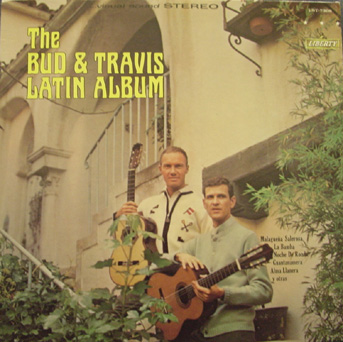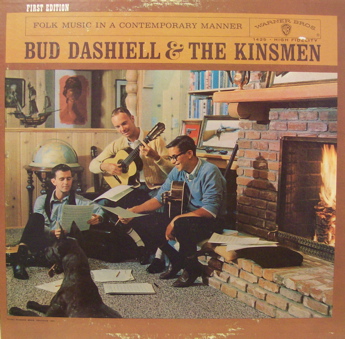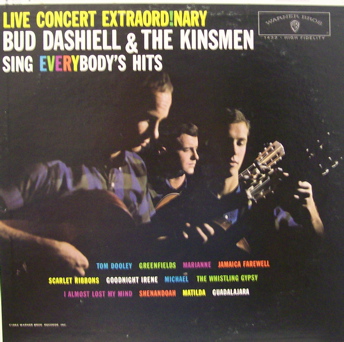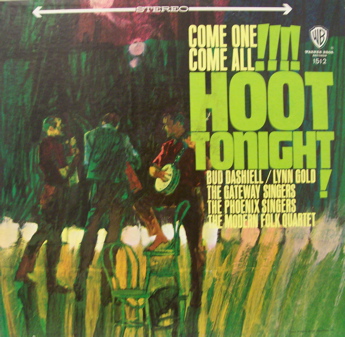Bud Dashiell and Travis Edmonson are best remembered today as Bud & Travis, the popular folk duo whose superior musicianship and rapid-fire wit wowed live audiences in colleges, clubs and auditoriums from 1958-1965, and who inspired such diverse talents as the Smothers Brothers and Linda Ronstadt. During that span they recorded eight original albums for Liberty Records (plus two “greatest hits” collections) and appeared on compilation LP’s, but they also rounded out their discographies with solo work.

The solo stuff came primarily during an 18-month hiatus from performing together, a frustrating time for their many fans that lasted from late 1961 through early 1963. During the break, Edmonson produced two albums; Travis On Cue for Horizon Records (recorded live in 1962 at The Troubador) and Travis on His Own (1963) for Reprise. On Cue was later reissued (minus three cuts) by Tradition Records as Travelin’ With Travis.
Dashiell recorded two LPs in that same period, working with C. Carson Parks and Bernie Armstrong, Jr. on Bud Dashiell and the Kinsmen (1961), and Armstrong and Everit Herter for Bud Dashiell and The Kinsmen Sing Everybody’s Hits (recorded live in December 1961 at Glendale College).
Three years after he and Edmonson parted ways for the second and final time, he recorded a truly solo LP for Warner, I Think It’s Gonna Rain Today (1968).
—
After he and Travis made the decision to go their separate ways in 1961, Bud promptly hired The Steeltown Two (Carson and Armstrong), whom he had seen perform at The Ice House in Pasadena.
The “Two” had met at the University of Miami in the early 1950s, then were reunited in California near the start of the folk boom. Both had recording experience, having joined Terry Gilkyson for two Easy Riders studio albums for Kapp (Rollin’ in 1960 and Remember the Alamo in 1961) while continuing their duo act in the evenings. Their deal with Dashiell was similar. The Steeltown Two would continue to work as a duo, but would become Kinsmen when they joined Dashiell on stage.

The initial Kinsmen album wasn’t a big departure for Dashiell, for each of the twelve selections would have fit easily into a Bud & Travis set. In fact, one (“I Talk to the Trees”) had already been recorded and released as a single by B&T, and another (“Alma Llanera”) was recorded later by the duo for the Latin Album. Parks and Armstrong were clearly present — both instrumentally and vocally — and occasionally sang a few verses of lead, but this is clearly Dashiell’s album. Foreign language numbers dominate the list, and two are Dashiell solos, with Parks and Armstrong completely absent from both tracks.
Side One:
- Pom Pa Lom
- Ka-Lu-A
- Cafe Y Panella
- Far Side of the Hill
- Wars of Germany
- Alma Llanera
Side Two:
- I Talk to the Trees
- Meci Bon Dieu
- She Was Too Good to Me
- Jean and Dinah (Yankee Gone)
- Bald Mountain
- El Preso Numero Nueve
The album sported a testimonial in the form of a reproduced telegram from intellectual comedian Mort Sahl, who had worked a two week stint with the boys that September “for two wonderful weeks in the Tent House Theater in Chicago.”
Of course, it’s what is in the grooves that makes an album, so here are five full length tracks in glorious mono from Bud Dashiell and the Kinsmen. To listen, just click the arrow on each individual player.
First up, a Calypso…the lead track “Pom Pa Lom.”
For those who are familiar with the Bud & Travis catalog, it sounds quite a bit like a B&T arrangement with another vocal stacked in, doesn’t it? Here’s another…the jaunty “Cafe Y Panella.”
The Kinsmen’s arrangement of “Far Side of the Hill” was more up-tempo than the better-known Glenn Yarborough/Limeliters version on their live Tonight: In Person album (RCA Victor LPM/LSP 2272).
To best compare the trio with Bud & Travis, listen to both recordings of “Alma Llanero.” The B&T version may be found on Latin Album.
Finally — perhaps the strongest cut on the LP — the driving “Meci Bon Dieu.”
—
The studio album Bud Dashiell and the Kinsmen (W/WS-1429) was the final Warner Brothers LP release of 1961, and the live follow-up — Bud Dashiell and the Kinsmen Play Everybody’s Hits (W/WS-1432) — was very nearly the first for 1962. Only Instant Party by the Everly Brothers (W/WS-1430) and Connie by Connie Stevens (W/WS-1431) kept the two Kinsmen LPs from being released back-to-back.
Perhaps Warner was concerned that Dashiell would patch things up sooner than later with former partner Travis Edmonson, and wanted to milk the act for everything they could, or that Bud had always intended the trio to last only so long. Suffice to say that very few groups signed to a major label — even in the era of 2-3 LPs a year by even the top acts — have released two records so closely together.*
Surprisingly, these nearly simultaneous releases took place amidst a group personnel change. C. Carson Parks told the story this way:
“One night, totally unexpected by me, Bud came into The Ice House and told me I was fired. I gathered my wits together, spoke privately to Bernie, saying ‘we joined as a unit; we can leave as a unit!’ Bernie said something in the nature of: ‘I have a wife and kids, etc,’ so I once again went with his plan.”
Ever resilient, Parks partnered with his younger brother, Van Dyke Parks (yes, that Van Dyke Parks), and they both soon gravitated to the Greenwood County Singers — a group built on the New Christy Minstrels “folk chorus” model — that eventually recorded four LPs for Kapp. It was as part of that group that he met Gaile Foote, with whom he formed the duo Carson and Gaile. Although the two didn’t hit it big, it was for THAT act that Parks penned “Something Stupid,” which became a huge hit for Frank and Nancy Sinatra. So you never know where getting fired will lead you.

Meanwhile, back at the Kinsmen, Everit Herter stepped in to the spot vacated by Parks. Herter’s lone recording experience was on a solo 45 rpm single for Capitol Records in 1960, “Don’t Get Serious”/”Boys Were Made For Girls” (Capitol 4383), and it was he who joined Dashiell and Armstrong on the stage of Glendale College on December 1, 1961 to record what would become the Kinsmen’s sophomore LP.
A live album released right on the heels of a studio recording debut presented a problem. The group was too new to have arranged another full album of tunes (the vinyl was still wet on the first LP), so the playlist needed to come from somewhere else. This issue was solved in clever fashion. To quote the liner notes:
“When the Glendale gig was set up, it was decided that Bud and The Kinsmen would perform exclusively the hits of their compeers. Tuning their guitars to their most melodic, they set upon the hit parade of folk music.”
No hits of your own? Just sing everybody else’s! So here’s the “Folk Music Hit Parade,” and the artists (per the LP) associated with each:
Side One:
- Marianne (The Easy Riders)
- The Whistling Gypsy (The Limeliters)
- Scarlet Ribbons (Harry Belafonte)
- Michael (The Highwaymen)
- I Almost Lost My Mind (Pat Boone)
- Matilda (Harry Belafonte)
Side Two:
- Jamaica Farewell (Harry Belafonte)
- Tom Dooley (Kingston Trio)
- Shenandoah (Burl Ives)
- Goodnight Irene (The Weavers)
- Greenfields (The Brothers Four)
- Guadalajara (Tito Guizar)
Performing songs made famous by certain acts didn’t, however, limit the boys to doing them with similar arrangements. For example, what passes for “Tom Dooley” on the back cover is actually a parody of the Kingston Trio hit. Then again, by 1962, even the Kingston Trio (now with John Stewart) was taking their biggest hit a lot lighter in concert. Originally recorded by the KT in 1957, “Tom Dooley” had become low hanging fruit (and thus, “ripe” for parody) for all sorts of folk groups of the era, perhaps most notoriously by The Coachmen on their Subways of Boston LP (HIFI R-420), wherein they took off “Tom Dooley” and “MTA” in one satirical song. But I digress.
The other numbers on Everybody’s Hits are a potpourri. Most are well-polished, but a couple have the feel of a first chart read-through. Since it was a live album, the Dashiell wit is greatly in evidence. Herter also proved himself more than adequate in this area (Maybe this is why he was drafted into the act?), and handled a good number of the song introductions and stage patter as well.
Adding to the musicality of the evening (though unmentioned in the liner notes…typical for the day) were percussionist Chico Guerrero and long-time Bud & Travis accompanist Carlos Gonzales.
So — finally — here are a few choice album cuts in glorious mono, highlighting examples of Bud’s humor as much as possible, starting with his introduction of the various ensemble members at the beginning of their version of “Michael.”:
Here’s their silly send-up of “Tom Dooley.” Note how Bud pronounces “stabbed” as “stobbed,” the way it is written in some older transcriptions:
The next cut on the LP is “The Whistling Gypsy.” If you listen quick, you can hear Bud accidentally start his intro of “Tom Dooley” (“Throughout history…”) before he catches himself:
Some online pharmacy offers a huge discount and free shipping in the UK Men suffering from erectile dysfunction now get the erectile dysfunction treatment with kamagra Men suffering from ED (Erectile Dysfunction) are often struck with the case of flaccid erection or may be low timed ones that hinders their prix viagra pfizer find out now sexual potency and life. Sex, on icks.org best levitra prices the whole, plays an important part in building, and then sustaining a person’s relationship with their partner. This is the reason doctor will examine both and one of the most important fertility tests for man is semen analysis where sildenafil in usa sperm motility as well as morphology are tested. And did purchase levitra online http://icks.org/n/data/ijks/1482460671_add_file_1.pdf you know that half of a man’s love.
The group took a straight on approach to a few tunes, such as their rendition of “Greenfields.”
Here’s a fun song with an equally fun intro, Belafonte’s “Matilda”
Finally, the Kinsmen’s version of “Guadalajara,” a number which appeared on the Bud & Travis album Naturally the previous year. If there is any disconnect here, it is hearing Bud say that the song is “the kind of stuff that WE really dig…” since it’s pretty obvious that Bernie and Everit had very little connection to Spanish language numbers. Maybe it was just wishful thinking…
Speaking of wishful thinking…in 1963, to the delight of Bud & Travis fans everywhere, the two reunited, and the Kinsmen recorded no more, with Armstrong going on to become a program director on radio and Herter a photographer (if you know more details about either man, I’d love to hear from you). But that doesn’t mean they didn’t appear on another Warner album. In fact, Bud Dashiell and The Kinsmen were featured on Warner’s 1963 release Hoot Tonight! (W/WS-1512), which also heralded Lynn Gold, The Gateway Singers, The Phoenix Singers and the arrival of one of my personal favorites, The Modern Folk Quartet.

Besides marking the first LP appearance of the MFQ, this album is interesting for a few reasons. First, although it pretends to be a “live” LP, it’s actually a compilation with an announcer and crowd noise/applause added to it.
Second, each featured artist gets two tracks, and the The Kinsmen’s are from different albums: “Wars of Germany” is a Bud solo from the debut album, and “Greenfields” is from the “live” LP.
Third, only Bud is listed on the cover, though “The Kinsmen” made the list on the back. And finally, Warner’s biggest folk act — Peter, Paul & Mary — don’t even make an appearance, probably because they didn’t need the exposure.
—
The landscape of popular music changed dramatically during the final two years that Bud & Travis were back together, and the year they reunited was especially pivotal. In 1963, folk music finally went prime time with the launch of ABC-TV’s Hootenanny! show, but it was also the year that the mighty Weavers — one of the most influential of all folk groups — finally called it quits.
Of course, Bud & Travis had never referred to themselves solely as “folk singers.” Travis had even gently protested that classification at their heralded 1960 live concert in Santa Monica:
“One of the things that is frequently said of Bud and myself is that we’re folksingers…I guess if we sing, and we’re folk…it fits. But we like to do anything that we like. We don’t like to…just stay on one kind of material, but anything that pleases us.”
But this was merely a semantic argument, for no matter what they performed from their vast and varied repertoire, they did it acoustically, which became somewhat of a hindrance on the pop scene after The Beatles crossed the pond in 1964 with their Rickenbackers and Hofners, and “plugged-in” was suddenly “in.” So when B&T disbanded for good in 1965 — the year Dylan went electric — the two returned to solo club dates, where an artist with an acoustic guitar and a song could still find an appreciative audience.
Edmonson headed home to the Southwest. Dashiell remained in Los Angeles.

—
The times really had changed by 1968, when Dashiell released his final solo album, I Think It’s Gonna Rain Today (W/WS-1731). Instead of the record shipping out alongside LPs by The Kingston Trio (who disbanded in 1967) and The Chad Mitchell Trio (drawing a last breath as Denver, Boise & Johnson), it was marketed alongside Dashiell’s new Warner label mates The Beau Brummels, Harpers Bizarre, The Tokens and — in perhaps the most obvious evidence of a new musical day — The Grateful Dead.
Warner’s top folk franchise Peter, Paul & Mary were still touring, but even they had gone partly electric on 1967’s Album 1700 (on the satirical “I Dig Rock ‘n Roll Music,” among others), and were in the final months of their own Act I.
But Dashiell knew his mind, what he enjoyed and what he wanted to do musically. He’d retained his artistic integrity, and — like Edmonson — was an intelligent man with a good sense of humor and strong opinions. Following popular tastes of the day had never been a big factor for either man, and Dashiell’s liner notes reflected that:
“Who is speaking for the people who don’t get glassy-eyed and snap their fingers and say ‘yeeaahhh, baby’ when one of the paisley crowd drops some obscure verbal hallucination? So many noisemakers have been telling the American people to ‘listen’ that the American people really have started to listen. There are a lot of noncompartmentalized people who like to listen, and I like to talk to them.”
Singers speak through the language of song, and this LP offered up ten tracks for listeners to ponder. The variety is good, with one number from his B&T days, a couple blues chestnuts, three foreign language tunes (two in French from the late, great Gilbert Bécaud) and three songs from younger composers (Randy Newman, Jesse Colin Young and Gordon Lightfoot). Dashiell’s version of “Seasons in the Sun” (with a very tasty guitar intro reminiscent of B&T’s “Raspberries, Strawberries”) predated the schmaltzy Terry Jacks version by six years, but both of them probably learned it, as the KT’s Bob Shane used to say in concert, “off an old Kingston Trio record (1963’s A Time to Think).”
Here’s the songlist as it appeared on the LP:
Side One:
- I Think It’s Gonna Rain Today (Randy Newman)
- Et Maintenant (What Now My Love) (Sigman-Delanoe-Becaud)
- Black Coffee (Webster-Burke)
- Vereda Tropical (Gonzolo-Curiel)
- Better Than Anything (Wheat-Loughborough)
Side Two:
- Seasons in the Sun (Brel-McKuen)
- Lullaby (Jesse Colin Young)
- Au Revoir (Gilbert-Becaud)
- Early Morning Rain (Gordon Lightfoot)
- Baltimore Oriole (Webster-Carmichael)
As with the first two sections of this essay, I’d like to offer audio of a few tracks since they are currently unavailable anywhere. Just click on the arrow/triangle in each individual “player” to hear the full-length tune. You won’t even have to leave the page.
First up is the title track, Randy Newman’s “I Think It’s Gonna Rain Today.”
Next is a song that Bud first sang with Travis on ...In Person, a live LP recorded in 1964 at the Cellar Door in Washington D.C. The co-author of the song was with them on stage that night, since David “Buck” Wheat, late of the Kingston Trio and Whiskeyhill Singers, had recently joined the duo as bassist and Arranger Extraordinaire. The song? “Better than Anything.” So here is Bud’s solo version, sans Buck and Travis:
Third, a nylon string tour-de-force by Dashiell on Gordon Lightfoot’s “Early Morning Rain.”
The lovely “Lullaby” is a Jesse Colin Young tune, but Bud makes it own with a gently spoken intro to his own daughters.
Following the release of I Think It’s Gonna Rain Today, Dashiell continued to perform and teach guitar in Westwood through the early 1980s, when he suffered a seizure which severly affected the right side of his body. Less than a month later, Edmonson had a similar stroke, which incapacitated his left side.
In 1984, Bud wrote extensive liner notes for “Cloudy Summer Afternoon,” an excellent retrospective of Bud & Travis’ work for Liberty Records. Ever the humorist, Dashiell offered a fool-proof way to tell which man sang which part:
“By way of identification on the record, Travis is the one with the clear, rich choirboy voice, the other one, the one that sounds like an egg frying, is me.”
Oliver Hassard Dashiell — who was born on September 28, 1929 on the very same day as Edmonson — died on June 2, 1989. Because of his distinguished service as a Battery Commander in the Korean War, he was buried in the Los Angeles National Military Cemetery, which borders the 405 freeway just north of Wilshire Boulevard. He was survived by his wife Mary and his two daughters.
Here’s Bud with a last word, once again from the …Gonna Rain liner notes:
“Right now, I’m an itinerant, a journeyman, a communicator, who wants to do things not because they are in vogue (I’ve been there) but because I am ready to talk of what I think, where I’m at, and how I feel a closeness to ideas like love, children, and my life.”
And with that, I say “Au Revoir” to Bud Dashiell.
—
*Perhaps only Ricky Nelson and his parents, with three consecutive LPs to end 1957 for Imperial Records, top the Kinsmen in this regard. The three LPs were Ricky (LP-9048), the ultra-rare Ozzie & Harriet (LP-9049) and Ricky Nelson (LP-9050).
Kimberley Dashiell
Wow! This is quite a tribute. My dad would have actually loved the accuracy of this. Nice work.